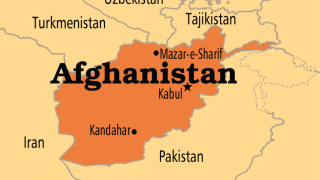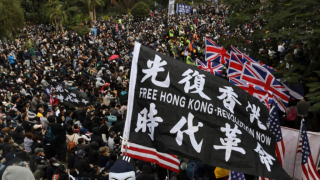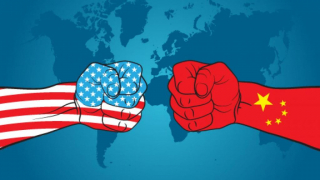Drifting at Sea on a Ship of Fools
As the imperial media commemorate the 20th anniversary of the attacks on the World Trade Center (an event akin to what the neoconservative crowd once longed for as a “new Pearl Harbor”), it bears noting that there exists, more than ever in recent memory, a stark contrast between a vision shared by States still clinging to the post-war international system embodied in the UN Charter and those (mostly partisans of a post-national ethos) who would attempt to convince public opinion that said Charter has from now on been replaced by what Anthony J. Blinken has referred as the “rule-based international order”.
The “Post-National” faction appears to have completely done away with the structuring virtue of the Charter in order to replace it with vague notions of “international justice”, “gender parity” while more generally paying heed to such chimera as “inclusiveness” and “diversity”. In doing so, these post-National “ersatz societies” have seemingly disemboweled the corpus of long-standing, time-enduring and crisis-tested norms of respect for national sovereignty, peaceful dispute resolutions, fact-based analysis and more generally the search for consensus.
As it were, the very semantics of the ancient art of diplomacy have undergone a profound transformation whereupon emotional (some might say hysterical) rhetoric has come to characterize the entire spectrum of discussions on such issue as the fight against terrorism.
Western pundits have accused States advocating for the respect of national sovereignty of engaging in “autocratic revisionism”. To wit, the loaded term “revisionist power” carries with it ominous undertones for it alludes to the denial of some of the most villainous chapters of the 20th Century.
In the light of such rhetoric, it becomes obvious that the search for commonality and reasonable discourse in diplomatic circles can quickly devolve into acrimonious finger-pointing and unneeded obstruction over the tritest issues which ALL members of the international community of nations have to grapple with.
This brings us to the dilemma over the issue of the normative advancement of international, some would say “universal” justice.
The legacy of Nuremberg and the philosophy of Human rights
At the close of the Second World War, the victorious Allies sought to for the first time in History to hold responsible the senior leadership of a defeated State, National-socialist Germany, by holding a series of trials in the city of Nuremberg.
In so doing, the Allies dramatically altered the prevailing corpus by adopting such notions as command responsibility, war crimes and crimes against humanity. Most notably, the Nuremberg tribunals introduced the concept of “crimes against peace”, thus paving the way for a seemingly irreconcilable dilemma between the normative “search for peace” and the means required to achieve it. In his opening statement to the Tribunal in November 1945, Justice Robert Jackson notably stated: “We must never forget that the record on which we judge these defendants today is the record on which history will judge us tomorrow. To pass these defendants a poisoned chalice is to put it to our own lips as well…”
Moreover, Jackson unambiguously pointed out that the treatment may indeed reveal itself to be worse than the illness it purports to cure: “If certain acts of violation of treaties are crimes, they are crimes whether the United States does them or whether Germany does them, and we are not prepared to lay down a rule of criminal conduct against others which we would not be willing to have invoked against us.”
The legacy of these trials remains controversial to this day as the United States and its Allies have since the end of the Cold War precisely resorted to aggression in order to impose “democracy” in areas of the world where, not surprisingly, the North Atlantic Treaty Organization seemed to have determined that it would further its geopolitical interests.
The Human Rights Religion
In pursuit of its crusade on behalf of “democracy and human rights”, the West indulged in a form of malignant narcissism sometimes bordering on outright hubris: indeed, who can forget former Secretary of State Madeleine Albright’s now infamous quip about the United States as “the indispensable nation”?
French legal scholar Jean-Louis HAROUEL expounded on the insidiousness of the normative approach as relates to human rights. Writing in his seminal book published in 2016, “Les Droits de l’homme contre le peuple”, “Human Rights Against the People”, HAROUEL denounces the hypocritical and selective application of the “Human Rights Religion” in which he sees the post-national State engaging in a distinct form of disincarnated millenarianism often against the interests of its own citizens:
“To be able to react, it will be necessary to give the “rule of law” a bit of a shove, as it is currently being imposed on Europeans in this positively suicidal fashion by the secular religion of human rights.”
Indeed, it was the neoconservatives themselves who spun the imposition of democracy as but one of their justifications for the 2003 unlawful invasion of Iraq. Notwithstanding the utter lack of evidence linking Saddam Hussein to the attacks on the World Trade Center, it became imperative “to fight them (who exactly?) over there so we do not have to fight them over here.”
The invasion of Afghanistan was itself sold to Western public opinion as an attempt to ensure that Afghan girls could attend school and pursue an education.
As Republican Congressman Lindsey Graham repeatedly once quipped:
“The Taliban have been overthrown in Afghanistan, music is no longer outlawed, cars have returned to the streets, and citizens are participating in the great experiment called democracy.
Millions of young people – including girls and women – are attending schools and universities with hope for their future and a desire to take Afghanistan forward, not backward. They are our best partners over time and their success is our success…”
The Rojava Project, the MEK and Masoud: Tools of Western meddling or Beacons of Progressive Enlightenment Fighting Obscurantism?
Many fashionable trends of fawning over exotic, Hollywood-like characters have inundated western media outlets and Parisian salons over the years.
Twenty years ago, the self-proclaimed philosopher Bernard-Henry LEVY was already hard at work agit-propping for the late Commander Masoud. The Afghan leader of the Northern Alliance was portrayed as the Che Guevara of the Panjshir Valley. No effort was spared to sell the warlord to public opinion as the embodiment of gallantry and courage. His skills as a military commander were described as legendary. The future looked bright indeed for the Lion of the Panjshir. That is until his life was abruptly ended in mysterious circumstances two days before September 11th, 2001.
In the wake of the attack on the World Trade Center, no amount of praise and faintly dissimulated sorrow was expanded to mourn Masoud as the stalwart defender of Afghan women’s rights.
Within three weeks following the attack on October 7th, the US rushed into Afghanistan to “seek revenge” on the Taliban, whom we were told, had not only given succor to Osama Bin Laden, but now refused to hand him over to “face justice”.
20 years later and after the US spent 2 trillion dollars on “democracy-building”, the French self-described philosopher’s thirst for more destabilizations has seemingly not been quenched.
“I just spoke to Ahmad Masoud on the phone. He told:” I am the son of Ahmad Shah Masoud; surrender is not part of my vocabulary.” This is the start. Resistance has just begun.”
Levy has for the last 40 years advocated against every country remotely perceived as refusing foreign interference in their own affairs; a concept which appears to elude the staunchly pro-Israel Frenchman.
Speaking to the Guardian in a 2012 interview prior to a special screening of his self-promoting “The Oath of Tobruk” before prominent members of the Syrian opposition, Levy boasted:
"I want what happened in Libya to be perceived as the proof that foreign intervention is possible in Syria. Homs today is Benghazi yesterday.”
Unsurprisingly having long called for the overthrow of the Syrian government (in line with the State department official policy of illegally occupying Syria’s oil-rich northeast (in order) to “keep an eye on Iran”), “BHL” has launched into a passionate advocacy campaign on behalf of the Syrian Kurds.
Speaking to Vanity Fair in 2017 while promoting “Peshmerga”, (a thinly veiled attempt at concealing a call for direct NATO intervention into a documentary), BHL lamented on the failure of NATO’s project of regime-change in Syria:
“You, we, could have made a no-fly zone. You, we, could have made a no-drive zone for heavy weaponry. You, we, could have made areas for protecting people. And so on. There were so many intermediary solutions between not doing anything and launching a large-scale war. Between “Iraq” and “nothing” there was a lot we could have tried.”
As things stand, NATO’s occupation of the Syrian northeast appears to aim for an alternative predicated on lending military and financial support to the self-proclaimed Kurdish Autonomous Administration; what Russia’s foreign Minister Sergei LAVROV stated amounts to attempts by the West to create a “quasi-state”. Speaking at the 2019 Second Paris Peace Forum, Lavrov described the situation as thus:
"On the eastern bank of the Euphrates River, they [the U.S.] built quasi-state structures and asked the Gulf countries to invest heavily so they could create a local administration based on the Syrian Democratic Forces [SDF], Kurdish PYD and others with the very blunt intention to separate this part of Syria and to control the oil fields there."
This “reality on the ground” approach (reminiscent of Israeli settlements in Occupied Palestine) is however revealing profound contradictions laying at the very heart of the post-national States’ world outlook; namely the unfeasibility of promoting “international justice” and a “rule-based order” when such lofty ideals are confronted to interests held by States still clinging to the UN Charter’s core principles of national sovereignty and political independence.
This inherent contradiction was highlighted in a February 2021 article published by Defense One in which the author alludes to the issue of putting ISIS detainees on trial as a fool’s errand despite enormous financial expenditures being poured in Kurdish-controlled areas.
“The U.S.-led anti-ISIS coalition is funding a dramatic expansion of a large detention facility in northeastern Syria, a move that may reduce the chance of breakouts but which signals that no better way is in sight to deal with captured foreign and local militants…The body that holds them — the SDF — is not an internationally-recognized government, making a valid court system impossible.”
The legal “impossibility” did not however prevent the Coalition Provisional Authority in Iraq from proceeding to set up a tribunal to judge the former President of that country. One must then arrive to the conclusion that times have indeed changed and that a geopolitical realignment succeeded in swaying the balance of international law back on the side of a strict interpretation of the UN Charter.
This most welcome development alas does not appear to have extended to the rehabilitation of terrorist organizations despite well-documented evidence that these entities have in no way forsaken their ideology.
Such is the case of the so-called People’s Mujahideen movement.
Reputed responsible for the deaths of over 10 000 Iranians, including the bombing in 1981 of offices occupied by the Islamic Republic of Iran’s Prime Minister, Mohammad Javad Bahonar which resulted in the death of the latter as well as that of President Mohammad Ali RajaiI and six other Iranian officials.
The MEK as the organization is known was listed as a terrorist organization until in the wake of the 2003 illegal US invasion of Iraq, a truce was signed with the Americans which provided for the MEK to establish their base in Ashraf.
This paved the way a process which resulted in the organization being delisted by the Americans in 2012; a move which followed the EU’s own whitewashing of the organization in 2009.
From this point on, the MEK benefitted from the political support of luminaries such as neoconservative die-hards such as John Bolton and John McCain, former CIA Director and Trump administration official Mike Pompeo, former Republican House-Speaker Newt Gingrich as well as former New-York Mayor and close TRUMP associate Rudolph Guliani.
In June 2018, the MEK held their annual meeting in Villepinte, a suburban town near PARIS where John Bolton, then acting as National Security Adviser, promised an enthusiastic crowd of over 25 000 attendees that they would be ruling Iran “before 2019”.
Not only did Bolton fail to fulfill his promise, he ended up being sacked by Donald Trump 18 months later over what the New-York Times described as Trump’s unease at “Mr. Bolton’s militant approach, to the point that he made barbed jokes in meetings about his adviser’s desire to get the United States into more wars.”
Lighting a Match over an Oil Barrel
To be sure, John Bolton and his ilk are still convinced that the use of military force to impose democracy abroad remains more relevant than ever and that what George W. BUSH once proclaimed as “the Calling of our Time” should continue to guide US foreign policy.
True to the movement’s roots harkening back to Leon Trotsky’s concept of “permanent revolution”, the neoconservatives suffer no contradiction and none of them ever faced adverse consequences over their deliberate campaign aimed at misleading the public into an unlawful war.
As a result of Washington’s flaunting of the most basic norms of international law, the Iraq War ended up heralding America’s slow but steady decline as a military superpower.
Not to be deterred, John Bolton has a new pet project.
The Middle East Monitor reported last June that Bush’s former Ambassador to the UN had joined the advisory council of a new outfit called the Turkish Democracy Project.
Obviously, the neocons want to punish Turkey’s Recep Erdogan over the latter’s decidedly insolent disregard for the rules as these pertain to being a loyal vassal to Washington.
One can wager that, not unlike fellow traveler Elliott Abram’s handling of the Venezuela file, Bolton will seek to prop up some as-of-yet unknown “democratic stalwart” behind whom Washington will throw its support.
Times have however changed and the United States is facing enormous problems on the home front.
The economy is at a stand-still, inflation is galloping, and civil liberties are on the wane.
In two seminal books titled “Blowback: The Costs and Consequences of the American Empire” and “Sorrows of Empire”, American political scientist Chalmer Johnson warned about the pitfalls of imperial overreach, warning that such policies usually led to blowback at home.
20 years have passed since that fateful morning in New-York. The world has witnessed an unleashing of violence which has since witnessed the resurgence of Russia as a force to be reckoned and China’s rise as the preeminent economic superpower has Washington fuming at the prospect of losing its status as the sole superpower.
US military budget has skyrocketed to unprecedented levels while the country’s infrastructures are collapsing. Economic inequality has widened with millions living under the threshold of poverty. The healthcare crisis has left countless US citizens unable to afford the most basic care and university campuses have turned into hotbeds of “Wokism”.
Impervious to this relentless descent into international irrelevance, senior officials in the Biden administration continue to lecture their counterparts about “human rights” and “rules-based international order” nonsense, not realizing that the US should begin by putting its own house in order.
Artificially concocted realities manufactured and fed to the public by corporate media throughout the Trump years have moreover managed to increase mass hysteria to dangerous levels which in turn have permeated the institutions and hobbled the conduct of foreign policy in a rational and dignified manner.
In “The Guns of August”, Barbara Tuchman soberly summarized the period preceding the outbreak of World War One.
“Europe was a heap of swords piled as delicately as jackstraws; one could not be pulled out without moving the others.”
The UN Charter might not be perfect, but it has managed to serve as the compass needed to keep the world at large away from the bane of nuclear annihilation. Our times require that it be restored as the ultimate arbiter of dispute lest those who would engage in political adventurism lead us all into the abyss.









